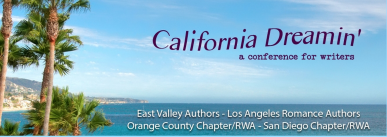I believe I was a step closer to reaching my dream when I showed up at this year’s AWP, held for the first time in LA, barely 30 miles from my home. Although I dreaded to have to navigate the chocked freeway to downtown LA, it was this “now or never” thought that gave me the needed push to register for the conference. At least, I wouldn’t have to fly and live in a strange city all by myself. It turned out ideal that I had to commute back and forth over the three days instead of staying in a hotel room. I had not only conquered one of the biggest and most academic-oriented writers’ conference but also overcome my fear of driving the most crowded and vicious freeways and the part of town to me too wild, too noisy, too bewildered to visit unaccompanied.
I was immediately rewarded for my bravery the minute I walked into the first panel of my personalized schedule, “Book Launch Confidential: Marketing Made Smarter, Not Harder.” The slideshow had started. I was sitting too far away from the screen but technology came to my rescue. Several screen shots later using my cellphone camera, I could read what were displayed to follow the conversation. I began learning. Terms like “campaign” and “PR expert” popped like corns and made me almost “feel the Bern” of a presidential campaign. On one slide were two columns, one labeled “Qualitative” and the other “Quantitative.” The panel moderator encouraged us to list our objectives under each one. What does an author want to achieve for herself and her book: connection, recognition, book deals, sale numbers, etc.? List them out and prioritize. See what activities you can do to achieve some or all of your goals without feeling depleted, drained, joyless. When overwhelmed, ask yourself: “What activities align with your campaign? What energizes you?”
She went on to say, “There are millions of things you can do to promote your book, from speaking/reading tour to radio talk to interview, but remember to schedule yourself.” In essence, I noted, do not let yourself be burned out (not “BERNed” out).
https://ithetiger.smugmug.com/photos/swfpopup.mg?AlbumKey=jFqwZn
“Social media have changed the world in a number of gigantic ways that shouldn’t be sneezed at,” said one panelist. “Publication is the creation of a new public,” said another. We were reminded that the written world would come full circle to return back to its oral beginning and give voice to the people who do not know how to read nor write. In a way that’s how movies function, transforming script to sound and images.
The above were only my impressions and note from attending one of the many, many AWP sessions. I had about 30 pages of notes to review and digest and can only give you a glimpse into this wonderful, soul-affirming, craft-enhancing AWP experience. I returned humble but hopeful. The ambition for AWP to be more inclusive and diversified has kick-started. I was counted in the first Asian American writer caucus. During the conference I spoke up. I asked questions. I exchanged business cards. I breathed in inspiration and breathe out aspiration. I wondered how so many women could raise a family and write prolifically, just like I marveled at the way many of them could walk around the conference in skirts and high heels, when I could hardly manage to survive the day toddling around in my well broken-in sneakers.
To the next AWP,
PS. Below are a few BIG bullet points from the notes I took.
The myth busters:
- Big 6: for work geared to the mainstream & mass market. Not easy to get in for lit fictions. Need agent to represent you, negotiate contracts, and champion your work. Agent’s style, personality, mode of communication need to fit those of an author for the relationship to last. Referral’s a PLUS for debut authors to get noticed.
- Indie Press: prefer no agents. Partnership with author for publicity. In some cases, support authors better.
- Platform: a must for nonfiction (except memoir)
- YA: no e-books. Need print copies
- Get on Twitter to connect with other writers, agents, authors and participate in insiders’ discussions. Learn about those special hashtags. More here: http://www.authormedia.com/44-essential-twitter-hashtags-every-author-should-know/ Keep Googling to discover & mine for treasured tags. Just now I discover you can pitch directly to agents via pitch contests on Twitter.
Tips: Authors with potential book series a plus. Suggested language in query letters: this is a standalone book with series potential. (Sounds like something you will find on Match.com, doesn’t it?)
…and much, much more. If you have more questions, ask me in the comment section of this blog and I’ll get back to you.


